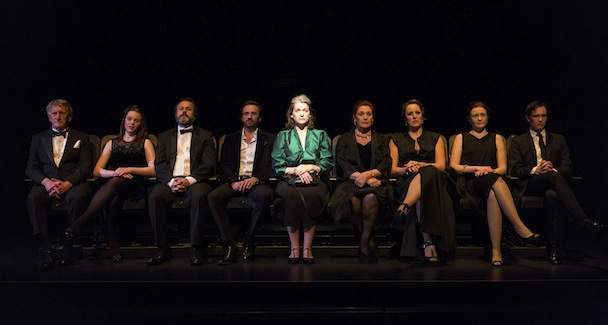Face to Face – Sydney Theatre Co
In Ingmar Bergman's film, now brought to the stage, a woman confronts her dissociation in psychology's traditional playground: dreams.
Overview
If Face to Face is anything to go by, 100 percent of psychiatrists have some serious issues of their own to resolve. In Ingmar Bergman's film, here adapted for the stage by constantly impressive young director Simon Stone, the protagonist, Jenny (Kerry Fox), is confronting a lifetime of dissociation. The only other shrink we meet (Humphrey Bower) has some intense schadenfreude, and he'll end up her doctor.
Despite Jenny's life looking beyond normal, she's long papered over her sense of disconnection from her basically invisible husband, her child (Jessica Nash), the auntie (Wendy Hughes) and uncle (John Gaden) who raised her, the patients she treats (Anna Martin), and the lover she's contemplating taking (Mitchell Butel). Eventually, she'll have to confront these spectres in psychology's traditional playground: dreams.
It's thrilling to see each new work Stone comes out with at this point, given his string of mature, vivacious, and influential productions from Thyestes to this year's Strange Interlude and Death of a Salesman. Face to Face was always destined to be a tough one. The film has a quality of cool reserve, keeping the characters' motivations enigmatic, but we're able to connect with Jenny through the camera's insistent close-ups. There's no such luxury in theatre, so heed is paid to theatricalising her psychological journey. Unfortunately, not enough is done, and, keeping to theme, Face to Face doesn't quite connect.
The creatives make much in the program notes of having never seen the film but rather responding to the screenplay and Bergman's own perceived flaws in it. It's a deliberately myopic move that may have sabotaged some of their decisions. They achieve a beautiful effect with the staging (Nick Schlieper), creating a grandiose, fey first half that overlaps time and place to make the real world seem like a dream, and making the dreams that dominate the second half a harsh, constrictive reality that demands to be faced. At the same time, something is lost in the overly literal parade of dreams. Dreams don't usually yell and lecture; they stalk and forebode.
That's assuming dreams do much meaningful at all. Face to Face is essentially outdated in that sense. The film was released in 1976, a time when it was thought that psychological issues could be traced back to underlying emotional trauma and that Freudian psychoanalysis, particularly of dreams, was the tool it took to fix it. Now our view of mental illness is permeated by more complex neurological and psychological factors. If this story has a timeless heart, it will take more dramaturgical digging to find it.
Face to Face has moments of deep humour and humanity, but ultimately a build-up of little things, some slightly flat performances included, mean it doesn't quite come together. Watching it on this stage, you can't help but be reminded of last year's surprising Gross und Klein, similarly a story of alienation from a female perspective among sets that convey the spectacularly surreal. In that comparison, Face to Face is left grasping for poetry, complexity, and relatability.





